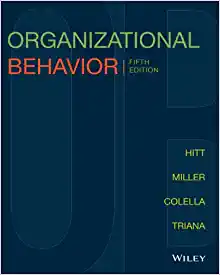My, what pointy hair you have is a suggested enhancement exercise to put this last question to
Question:
My, what pointy hair you have is a suggested enhancement exercise to put this last question to test and have some fun with it. It is quite likely that all of your learners know Scott Adam’s cartoon series Dilbert and his “Pointy-haired Manager.” The running joke with him is how he will stop at nothing to keep his managership. His job is his end as well as his means of making a living. Pouring a liberal dose of poison into the waters that are Dilbert’s workplace seems to keep his troops too weak to rebel and his paycheck coming. How far off the mark is this tragic-comic fellow from managers your students have known? Could they have been perpetuating an outmoded structure and risking all in a toxic culture, to sustain their lucrative managerships? On the other hand, is this managerial behavior something that only happens in the funny papers?
a. Bring and show a few panels of Dilbert comic strips to set the scene and mood.
b. Display these two lines of Little Red Riding hood-like dialogue:
“My, what pointy hair you have!”
“Only the better to exploit you with, my dear.”
c. Organize the class in pairs to allow for the most intensive interchange.
d. Ask each to tell the other of a time when they experienced a Pointy-haired Manager (PHM) first hand. If none, then ask them to re-tell a second-hand story told to them by another who has.
e. Was there exploitation in this instance? Were they and others resigned to this condition? Most importantly, might the organization’s strategy have been better served, if this PHM had cooperated and freed the structure to be reformed to make better use of the talents and resources of the unit?
f. Each partner tells the other her or his PHM story.
g. Ask the pairs to pause now, and follow this direction. On the count of three, they are to raise both hands to each side of their heads and feel for “points.” Have them discuss candidly with each other just how pointy their heads may already be, as they perform managerial roles currently or as they have been envisioning a rise in the ranks in their careers. Then, have them address one more question: Can one have a managerial aspect to their careers without “pointed hair,” or is it pointless to consider such an idealist prospect?
h. You may have the time and inclination to have people volunteer some lessons learned inside their pairs, or have them write up for future reference.
Step by Step Answer:






